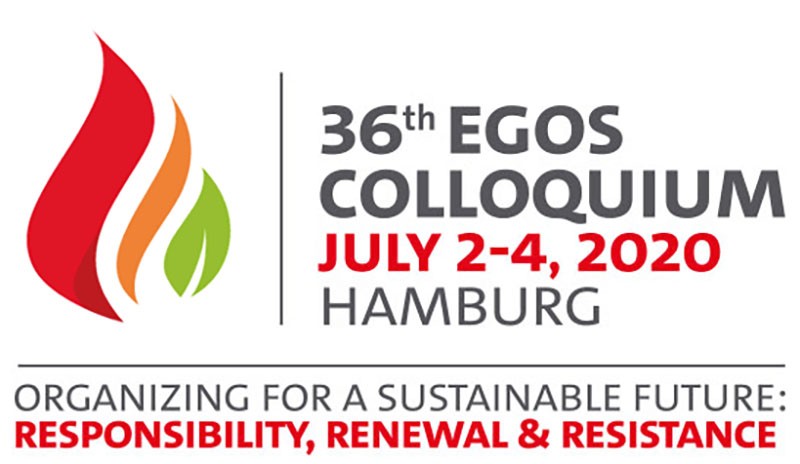Sub-theme 39: Organizing Identities: Sustaining the Agile Self ---> CANCELLED!
Call for Papers
The theme of the 36th EGOS Colloquium asks that we develop novel avenues for thinking critically about the social and societal
responsibilities of organizations, including our own ways of organizing ourselves in universities and our responsibilities
as individual academics. Organizational scholars are in danger of taking for granted the notion that “agile” identities are
constitutive of our post-modern world (Coupland & Spedale, forthcoming). In so doing, we contribute to the normalisation
of the discourse of choice, flexibility and diversity that underpins an oppressive system of relations at work, legitimising
control and obedience. Our valorisation of agility is, paradoxically, an instrument of “unfreedom” (Marcuse, 1984).
Organizational processes and practices can enable or constrain the identities available to individuals within organizations
(Alvesson et al., 2008; Grey, 1994; Thomas & Davies, 2005; Ybema et al., 2009). Organizations in Western societies are
increasingly permeated by an ideology infused with neo-liberalism, a new spirit of capitalism (Boltanski & Chiapello,
2005) that demands, indeed commands, agility. The never-ending project of becoming “agile” selves at work, however, operates
as a double-edged sword. On the positive side, it encourages self-expression and individuality. On the other side, the mythical
alliance between freedom, choice and identity (Gabriel, 2015) engenders a permanent sense of instability, insecurity and precarity.
In organizational contexts characterized by change employees struggle successfully to maintain a coherent sense of who they
are and wish to be through continuous reinventions of the self (Fleming & Spicer, 2003): these identity projects are never-ending
works-in-progress.
In this sub-theme we want further to develop our understanding of the constructed, relational
and situational characteristics of identity practices and processes (Coupland & Brown, 2012). We are particularly interested
in papers that explore the entanglement of the discursive, material and symbolic. In keeping with the theme of the Colloquium,
we seek papers that reflect on how we as organizational scholars may be culpable through how our ‘talk’ about identities might
be normalizing dysfunctional identity practices.
We invite papers that (inter alia) explore:
Identity outcomes. Studies of identity have tended to focus on processes without exploring outcomes. In particular, the costs and downsides of identity work have been under-researched (Brown, 2015). How can identity work help individuals cope with change, resist constraints and manage demands to be agile? What are the implications of identity clashes and conflicts for individual and collective well-being?
Embodiment, materiality and identity. Acknowledging the embodied, sensory, individual in identity research is an important perspective which offers opportunities to explore just how agile identities can be. How do bodies demonstrate the material limits of identity work?
Identity regulation. How do organizations seek to manage employee identities? How do employees manage their identities to conform to organizational expectations? How do organizational processes contribute to the gendering of identity?
Identity transitions. Much attention has focused on issues of identity liminality, adaptation and transition (e.g., Beech, 2011). How do those who regard themselves as outsiders learn to ‘be’ in organizations? What is at risk when we cease to be ourselves at work? How do people transition into roles (e.g. into management roles) in different sets of circumstances, e.g. where they articulate feelings of ambivalence, or nostalgia, or regret?
Identity and recognition. What are the consequences of conforming to organizational norms in order to be recognized as ‘good’ workers, and what is the impact on those who cannot, or choose not to, conform? How are people’s identities sustainably (or not) negotiated, confirmed and contested in interactions with others and what are the implications of these processes for organizations? What is the role of reflexivity in identity work?
References
- Alvesson, M., Ashcraft, K.L., Thomas, R. (2008): “Identity Matters: Reflections on the Construction of Identity Scholarship in Organization Studies.” Organization, 15 (1), 5–28.
- Beech, N. (2011): “Liminality and the practices of identity reconstruction.” Human Relations, 64 (2), 285–302.
- Boltanski, L., & Chiapello, E. (2005): The New Spirit of Capitalism. London: Verso.
- Brown, A.D. (2015): “Identities and Identity Work in Organizations.” International Journal of Management Reviews, 17 (1), 20–40.
- Coupland, C., & Brown, A.D. (2012): “Identities in Action: Processes and Outcomes.” Scandinavian Journal of Management, 28 (1), 1–4.
- Coupland, C., & Spedale, S. (forthcoming): Agile identities: Fragile humans? In: A.D. Brown (ed.): Oxford Handbook of Identities in Organizations. Oxford: Oxford University Press; https://global.oup.com/academic/product/the-oxford-handbook-of-identities-in-organizations-9780198827115?type=listing&lang=en&cc=in
- Fleming, P., & Spicer, A. (2003): “Working at a Cynical Distance: Implications for Power, Subjectivity and Resistance.” Organization, 10 (1), 157–179.
- Grey, C. (1999): “Career as a Project of the Self and Labour Process Discipline.” Sociology, 28 (2), 479–497.
- Marcuse, H. (1964): One-Dimensional Man. London: Routledge & Keegan Paul.
- Thomas, R., & Davies, A. (2005): “Theorizing the Micro-politics of Resistance: New Public Management and Managerial Identities in the UK Public Services.” Organization Studies, 26 (5), 683–706.
- Thomas, R., Hardy, C., Cutcher, L., & Ainsworth, S. (2014): “What’s Age Got to Do With It? On the Critical Analysis of Age and Organizations.” Organization Studies, 35 (11), 1569–1584.
- Ybema, S. Keenoy, T. Oswick, C. Beverungen, A. Ellis, N., & Sabelis, I. (2009): “Articulating identities.” Human Relations, 62 (3), 299–322.


